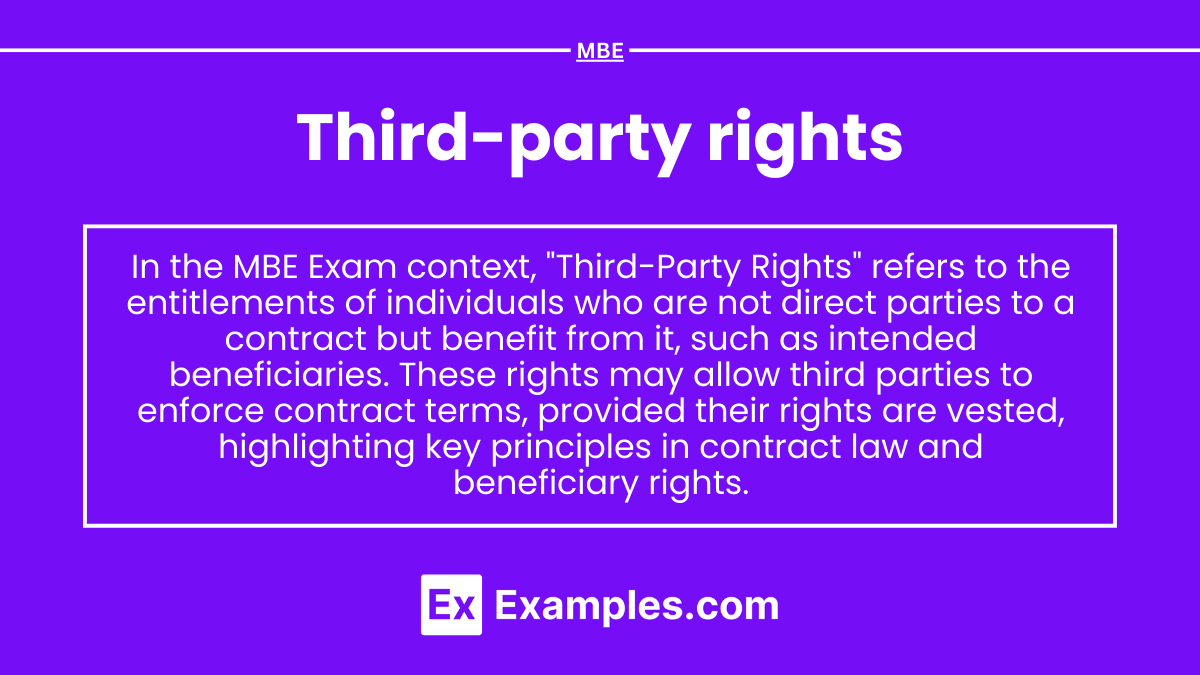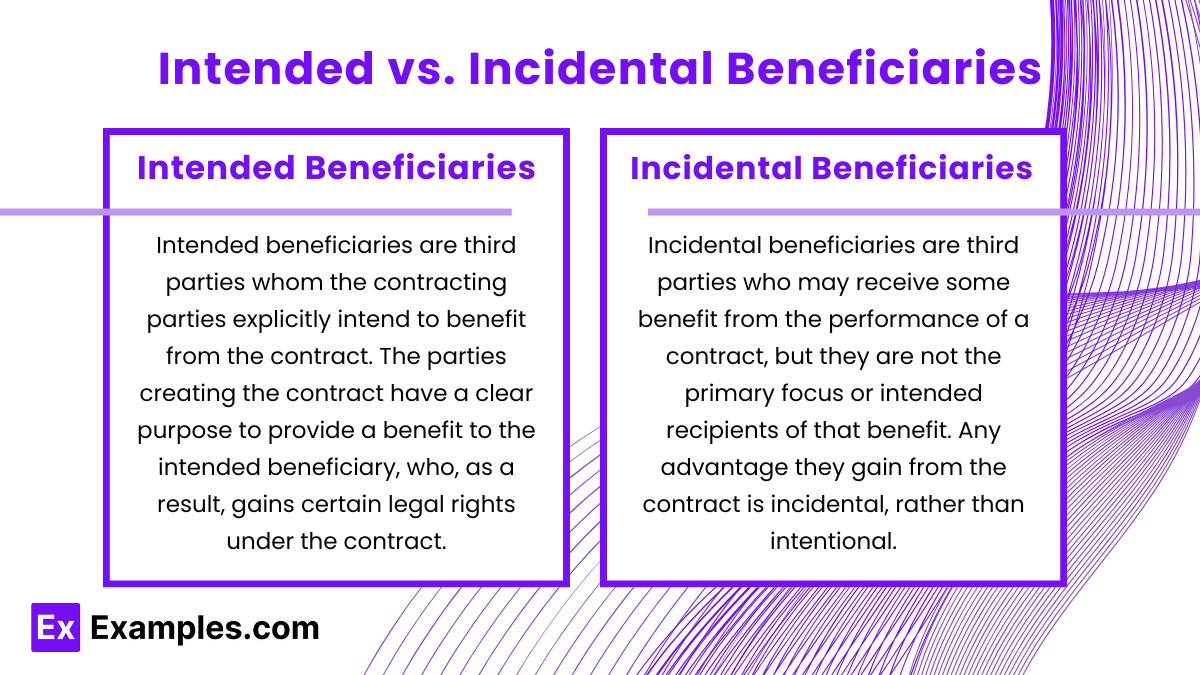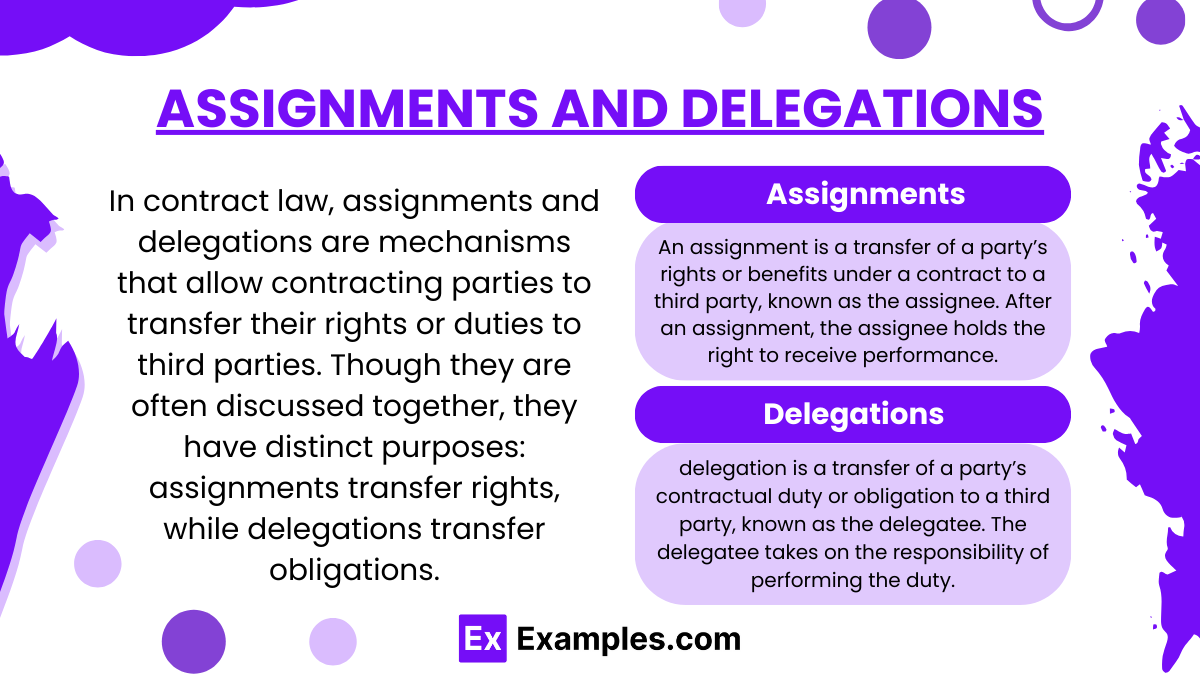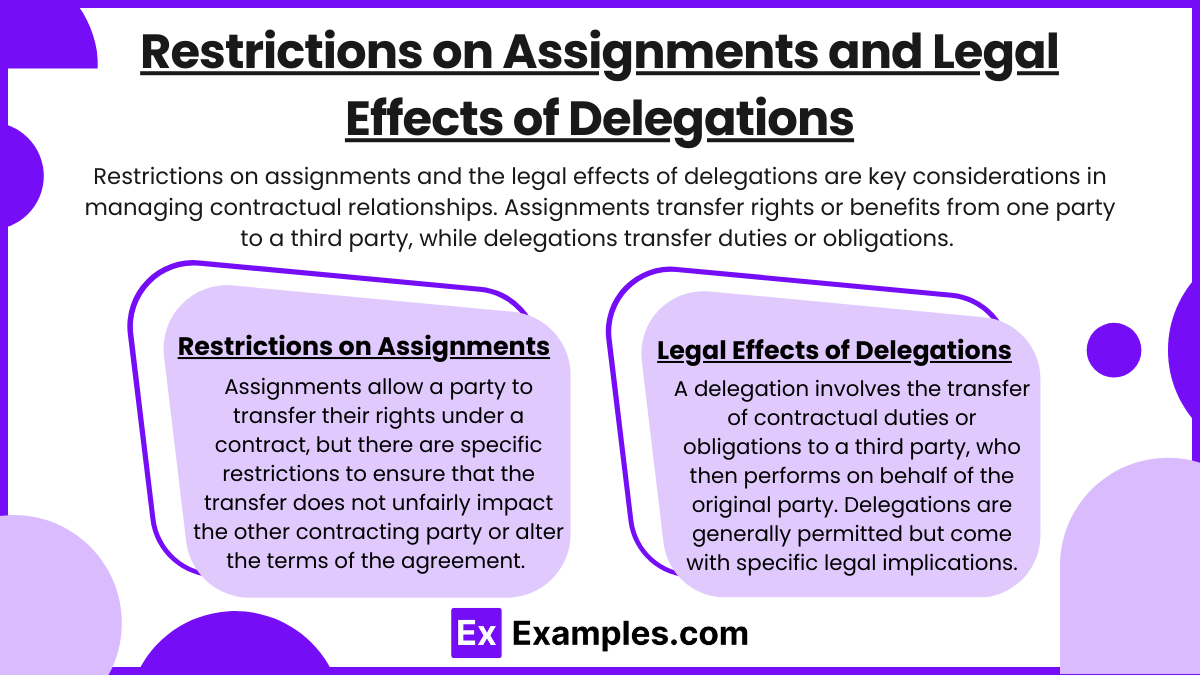Third-party rights involve the legal principles that determine when someone who is not an original party to a contract or transaction may enforce or be affected by it. This topic covers third-party beneficiaries, including intended and incidental beneficiaries, as well as their rights to enforce contracts. Additionally, it explores assignments and delegations, where rights or duties under a contract are transferred to third parties. A clear understanding of third-party rights is essential for analyzing contract enforceability, protecting involved parties, and resolving disputes where non-parties may have a stake.
Learning Objectives
In studying "Third-Party Rights" for the MBE, you should learn to identify and understand the rights and obligations of third parties in contractual relationships. Distinguish between intended and incidental beneficiaries and their ability to enforce contract terms. Analyze scenarios involving assignments and delegations, understanding how rights and duties can be transferred or assumed by third parties. Evaluate restrictions on assignments and the legal effects of delegations, including when the original party remains liable. Additionally, recognize defenses available to obligors against third parties and the rights of third-party beneficiaries under common law principles. Develop skills in applying these concepts to resolve questions about enforceability and liability in multi-party contracts.
Identifying Third-Party Rights and Obligations in Contractual Relationships
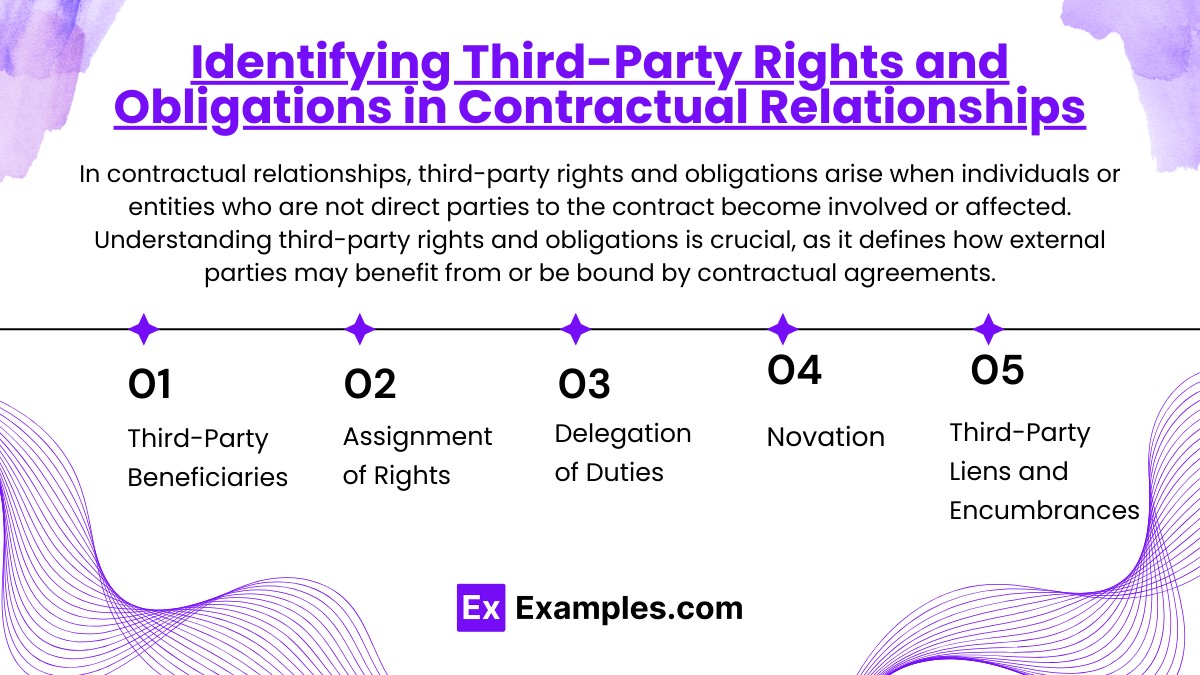
In contractual relationships, third-party rights and obligations arise when individuals or entities who are not direct parties to the contract become involved or affected. Understanding third-party rights and obligations is crucial, as it defines how external parties may benefit from or be bound by contractual agreements. Here’s an overview of the common types of third-party rights and obligations, including their legal basis and implications:
1. Third-Party Beneficiaries
Definition: A third-party beneficiary is someone who is not a direct party to a contract but is intended to benefit from the contract’s performance. If the contracting parties explicitly intend for the third party to receive a benefit, the third party may have legal rights under the contract.
Types of Third-Party Beneficiaries:
Intended Beneficiaries: These beneficiaries are explicitly identified or intended by the contracting parties to benefit from the contract. Intended beneficiaries have enforceable rights to compel performance or sue for breach of contract if their benefit is denied.
Incidental Beneficiaries: These beneficiaries may receive an unintended benefit from the contract, but they are not specifically intended to benefit. Incidental beneficiaries typically do not have enforceable rights, as they are not directly recognized in the contract.
Example: In a life insurance contract, the insured person names a beneficiary who will receive the policy payout upon their death. The named beneficiary is an intended third-party beneficiary with enforceable rights under the contract.
Legal Rights: Intended beneficiaries have the right to enforce the contract terms that benefit them. Incidental beneficiaries, on the other hand, lack the legal standing to enforce the contract because they were not specifically intended to benefit.
2. Assignment of Rights
Definition: Assignment occurs when one party to a contract (the assignor) transfers their contractual rights to a third party (the assignee). The assignee, now holding the assigned rights, may have the ability to enforce those rights directly.
Conditions for Assignment:
Consent: Some contracts may require the consent of the non-assigning party for an assignment to be valid.
Limitations in the Contract: Contracts can include clauses restricting or prohibiting assignment. If a contract explicitly prohibits assignment, any attempt to assign rights may be invalid.
Type of Rights: Certain rights may not be assignable due to their personal nature (e.g., employment contracts or personal services), where the identity of the party is essential.
Example: A landlord can assign their right to collect rent payments to a third party, such as a financial institution, which then has the right to collect rent directly from the tenant.
Legal Rights and Obligations:
The assignee gains the right to enforce the assigned rights against the non-assigning party, who must recognize the assignee as having the same rights as the original party.
The assignor generally relinquishes their rights once they are assigned, but they may retain some liabilities unless explicitly waived.
3. Delegation of Duties
Definition: Delegation occurs when one party to a contract (the delegator) transfers their duty to perform a contractual obligation to a third party (the delegatee). The delegatee is then responsible for fulfilling the duty, but the delegator may still be liable if the delegatee fails to perform.
Conditions for Delegation:
Consent of the Non-Delegating Party: In some cases, delegation may require consent, particularly if the contract involves personal services where the specific qualifications of the original party are crucial.
Limitations in the Contract: Contracts may include clauses that prohibit or restrict delegation.
Example: A contractor may delegate specific construction tasks to a subcontractor. However, if the subcontractor fails to complete the work, the contractor remains responsible to the client.
Legal Rights and Obligations:
The delegatee is obligated to perform the duty, but if they fail, the original party (delegator) remains liable to the non-delegating party. The non-delegating party has the right to enforce the contract against the delegator if the delegatee’s performance is unsatisfactory.
In cases where full responsibility is transferred (known as a “novation”), the delegator is released from liability, and the delegatee assumes all obligations.
4. Novation
Definition: Novation is a process that replaces one party in a contract with a third party, with the consent of all original parties. This creates a new contract, effectively transferring both rights and obligations from the original party to the third party.
Conditions for Novation:
Consent of All Parties: All parties involved (the original contracting parties and the new party) must agree to the novation for it to be valid.
Formation of a New Contract: Novation is treated as a new contract, extinguishing the original contract and transferring all rights and obligations to the new party.
Example: In a loan contract, if the lender wishes to transfer the loan to another bank, novation can be used to replace the original lender with the new bank, with the borrower’s consent. The new bank assumes all rights to receive payments and obligations to maintain the loan terms.
Legal Rights and Obligations:
The third party (new party) assumes all rights and obligations of the original party, while the original party is released from all liability.
Novation fully transfers both rights and obligations, making it distinct from assignment (where only rights are transferred) and delegation (where obligations are transferred but liability remains).
5. Third-Party Liens and Encumbrances
Definition: A lien or encumbrance is a legal claim or charge on property, typically created when a party has a financial interest in the property due to a debt. Third parties who hold liens have certain rights in relation to the property and can enforce their claim if the debt is unpaid.
Types of Liens:
Consensual Liens: Created by agreement, such as a mortgage, where the lender has a claim on the property as security for the loan.
Statutory Liens: Imposed by law, such as tax liens or mechanic’s liens, where the property owner owes money for specific services or obligations.
Example: A bank that provides a mortgage loan has a lien on the borrower’s property. If the borrower fails to make payments, the bank has the right to foreclose and recover the debt.
Legal Rights and Obligations:
The third-party lienholder has the right to enforce their claim on the property if the debt is unpaid, which may include the right to foreclose.
The property owner has the obligation to fulfill the debt terms to avoid enforcement of the lien.
Intended vs. Incidental Beneficiaries
In contract law, third-party beneficiaries are individuals or entities who, though not direct parties to a contract, stand to benefit from its performance. Intended beneficiaries and incidental beneficiaries represent two distinct categories of third-party beneficiaries, with differing rights under the contract. Here’s an in-depth look at each type and how they compare:
1. Intended Beneficiaries
Definition: Intended beneficiaries are third parties whom the contracting parties explicitly intend to benefit from the contract. The parties creating the contract have a clear purpose to provide a benefit to the intended beneficiary, who, as a result, gains certain legal rights under the contract.
Rights: Because they are specifically intended to benefit, intended beneficiaries typically have enforceable rights under the contract. If the contract is breached, an intended beneficiary may have the right to sue for performance or damages, depending on the nature of the contract.
Types of Intended Beneficiaries:
Creditor Beneficiaries: These beneficiaries are owed a debt by one of the contracting parties. The contract is created to satisfy or discharge that debt. For example, if a debtor promises to pay a third party using funds from another contract, that third party becomes a creditor beneficiary and can enforce the contract if it is not performed.
Donee Beneficiaries: These beneficiaries receive a benefit as a gift or favor from the contract. For example, in a life insurance policy, the policyholder’s designated beneficiary is a donee beneficiary who receives the insurance payout upon the policyholder’s death.
Example: In a life insurance contract, the insured individual names a family member as the beneficiary who will receive the payout upon their death. This family member is an intended beneficiary with enforceable rights, meaning they can claim the policy payout if the insurer fails to pay.
Legal Standing: Intended beneficiaries have standing to enforce the contract against the party that owes them the benefit. This enforceable right arises when the contract is made, provided it was created with the clear intention of benefiting the third party.
2. Incidental Beneficiaries
Definition: Incidental beneficiaries are third parties who may receive some benefit from the performance of a contract, but they are not the primary focus or intended recipients of that benefit. Any advantage they gain from the contract is incidental, rather than intentional.
Rights: Unlike intended beneficiaries, incidental beneficiaries do not have enforceable rights under the contract. Since the contracting parties did not intend to benefit them directly, incidental beneficiaries cannot sue for performance or damages if the contract is breached.
Example: If a city contracts with a construction company to build a new public road, nearby businesses might benefit from increased foot traffic due to improved accessibility. However, these businesses are incidental beneficiaries—they were not the primary focus of the contract, so they cannot enforce it.
Legal Standing: Incidental beneficiaries lack legal standing to enforce the contract. Even if the contract's performance indirectly benefits them, they cannot hold the contracting parties accountable for any breach or non-performance, as they were not specifically intended to benefit.
Assignments and Delegations
In contract law, assignments and delegations are mechanisms that allow contracting parties to transfer their rights or duties to third parties. Though they are often discussed together, they have distinct purposes: assignments transfer rights, while delegations transfer obligations. Here’s a closer look at the key aspects, differences, and legal implications of assignments and delegations:
1. Assignments
Definition: An assignment is a transfer of a party’s rights or benefits under a contract to a third party, known as the assignee. After an assignment, the assignee holds the right to receive performance or payment from the other contracting party.
Key Aspects:
Assignor: The original party who holds the contractual right and transfers it to a third party.
Assignee: The third party who receives the assigned rights and gains the ability to enforce those rights.
Rights Transferred: Commonly assigned rights include rights to receive payment, deliverables, or other benefits specified in the contract.
Requirements for a Valid Assignment:
Intent to Transfer Rights: The assignor must clearly express an intent to transfer their rights to the assignee.
Consent of Non-Assigning Party: Some contracts require the consent of the non-assigning party for an assignment to be valid, especially in cases where the contract prohibits or restricts assignment.
Notice to the Obligor: The party obligated to perform (obligor) must often be notified of the assignment to ensure they recognize the assignee’s right to receive performance.
Example: A company (assignor) that is owed money under a contract may assign its right to receive payment to a financing company (assignee). The financing company can then collect payment directly from the obligor.
Legal Implications:
Transfer of Rights, Not Obligations: Assignments transfer rights but do not transfer the assignor’s obligations. The assignor remains liable for any obligations unless otherwise agreed.
Defenses: The obligor can assert any defenses against the assignee that they could have asserted against the assignor (e.g., if the assignor failed to perform a required duty).
Restrictions: Certain rights are non-assignable if they involve personal services, alter the contract’s performance, or are explicitly restricted in the contract.
2. Delegations
Definition: A delegation is a transfer of a party’s contractual duty or obligation to a third party, known as the delegatee. The delegatee takes on the responsibility of performing the duty, though the original party (delegator) often remains liable for the performance.
Key Aspects:
Delegator: The original party who transfers their duty to a third party.
Delegatee: The third party who assumes the duty to perform on behalf of the delegator.
Obligations Transferred: Typical obligations that may be delegated include tasks, services, or deliverables required under the contract.
Requirements for a Valid Delegation:
Consent of the Non-Delegating Party: Consent is sometimes required for a delegation, especially if the duty involves personal services or unique skills, where the original party’s involvement is critical to performance.
Notice to the Non-Delegating Party: In some cases, notifying the non-delegating party (obligee) is necessary to formalize the delegation.
Example: A contractor (delegator) hired to build a house may delegate certain tasks, such as electrical work, to a subcontractor (delegatee). The subcontractor performs those specific tasks but the contractor remains responsible for the house’s completion.
Legal Implications:
Delegator’s Liability: Generally, the delegator remains liable for the delegatee’s performance. If the delegatee fails to perform, the non-delegating party can still hold the delegator accountable.
Non-Delegable Duties: Certain duties cannot be delegated, particularly those involving unique personal services, specialized skills, or trust-based relationships (e.g., attorney-client relationships).
Novation: In some cases, if the non-delegating party agrees, a novation can replace the delegator with the delegatee, fully releasing the delegator from liability.
Restrictions on Assignments and Legal Effects of Delegations
Restrictions on assignments and the legal effects of delegations are key considerations in managing contractual relationships. Assignments transfer rights or benefits from one party to a third party, while delegations transfer duties or obligations. Both assignments and delegations are subject to certain restrictions and legal implications, especially when they affect the original contract’s performance or create new liabilities.
Restrictions on Assignments
Assignments allow a party to transfer their rights under a contract, but there are specific restrictions to ensure that the transfer does not unfairly impact the other contracting party or alter the terms of the agreement. Common restrictions include:
Contractual Prohibitions on Assignment:
No Assignment Clause: Many contracts contain a “no assignment” clause, which explicitly prohibits any assignment of rights without the consent of the non-assigning party. These clauses are often found in contracts where the non-assigning party has a vested interest in maintaining the original contract terms.
Consent Requirement: If a contract permits assignment but requires prior consent, the assignor must seek approval from the non-assigning party before transferring their rights. This restriction allows the non-assigning party to control who benefits from their performance and to assess whether the assignee is a suitable substitute.
Nature of the Rights:
Personal Rights and Unique Contracts: Rights involving personal services or unique qualities are generally non-assignable because they rely on the specific identity or skill of the original party. For example, a singer’s contract to perform at a specific venue cannot be assigned to another singer, as the contract relies on the original performer’s unique talents.
Materially Altering Performance: An assignment may be restricted if it would materially change the nature of the contract or place an undue burden on the non-assigning party. For example, an assignment that requires the non-assigning party to perform at a different location or under different conditions than originally agreed may be invalidated.
Statutory and Legal Limitations:
Certain laws prohibit the assignment of specific types of rights. For example, some government contracts, intellectual property rights, and certain personal injury claims may not be assignable due to statutory restrictions or public policy considerations.
Legal Consequences of Violating Assignment Restrictions:
Invalidation of the Assignment: If an assignment violates a contract’s no-assignment clause, it is typically considered void, meaning the assignee does not gain any rights under the contract.
Right to Terminate: In some cases, an unauthorized assignment may grant the non-assigning party the right to terminate the contract or seek damages for any losses caused by the breach of the assignment restriction.
Legal Effects of Delegations
A delegation involves the transfer of contractual duties or obligations to a third party (delegatee), who then performs on behalf of the original party (delegator). Delegations are generally permitted but come with specific legal implications and potential limitations:
Continued Liability of the Delegator:
Retained Responsibility: Even after delegation, the delegator typically remains liable for the performance of the duties. If the delegatee fails to perform, the non-delegating party (obligee) can still hold the delegator accountable for fulfilling the contractual obligations.
Exceptions through Novation: In some cases, the parties may agree to a novation, which substitutes the delegatee for the delegator, fully transferring both rights and obligations. In a novation, the delegator is released from liability, and the delegatee assumes full responsibility.
Non-Delegable Duties:
Personal Services and Unique Skills: Duties that involve personal services or require unique skills are generally non-delegable because they rely on the individual abilities or qualities of the original party. Examples include contracts with artists, specialized consultants, or professional athletes.
Trust-Based Obligations: Delegations that would breach the trust between the original contracting parties are often not allowed. For instance, an attorney-client agreement cannot be delegated because the client’s trust and confidence in the attorney are central to the relationship.
Effect on the Contract:
Delegator’s Obligation to Ensure Performance: Even if a delegation is permitted, the delegator must ensure that the delegatee performs as required by the contract. The non-delegating party has the right to enforce the contract terms as initially agreed, which means that inadequate performance by the delegatee may be grounds for breach of contract.
Right to Refuse Performance by Delegatee: If the contract or applicable law prohibits delegation, the non-delegating party may refuse performance by the delegatee. This protects the non-delegating party’s right to receive performance directly from the delegator if that was the original intent.
Liabilities and Remedies in Case of Non-Performance:
Breach of Contract: If the delegatee fails to perform the duties, the non-delegating party can pursue legal action against the delegator for breach of contract. The delegator may, in turn, seek recourse from the delegatee for damages or losses incurred.
Limited Right to Sue the Delegatee: In some cases, the non-delegating party may have limited rights to pursue the delegatee directly for non-performance, depending on the specific contract terms and any agreements made among the parties.
Examples
Example 1: Beneficiary in a Life Insurance Policy
In a life insurance contract, the policyholder designates a beneficiary who is a third party. The beneficiary has the right to receive the insurance payout upon the death of the policyholder, even though they are not a party to the contract itself. This illustrates how third-party rights can arise from an agreement between two other parties.
Example 2: Tenant’s Right to Sublet
A tenant in a lease agreement may have the right to sublet the rental property to another person, who is a third party to the original lease contract. The landlord’s consent or restrictions on subletting are usually specified in the lease terms, but the tenant's right to assign this interest is a third-party right.
Example 3: Contract for the Benefit of a Third Party
In many contracts, the primary parties involved may intend for the contract to benefit a third party. For example, a construction contract might stipulate that the builder will complete work on behalf of the property owner, but a bank may have a right to ensure the work is completed before payment is made, creating third-party rights in the contract.
Example 4: Consumer Protection Laws
Third-party rights are often recognized in consumer protection laws, where consumers (who are not a party to the manufacturing contract) have certain rights against manufacturers or service providers. For example, a consumer who buys a defective product has the right to claim compensation or a refund, even though they were not part of the contract between the manufacturer and retailer.
Example 5: Intellectual Property Licensing
In the case of intellectual property, such as patents or copyrights, a third party may be granted rights through licensing agreements. For example, a software company may grant a third-party developer the right to use its software under specific conditions. The third party has rights to use the intellectual property in exchange for payment or other terms set in the agreement.
Practice Questions
Question 1
In which of the following situations would a third party most likely have enforceable rights under a contract?
A) When the third party is mentioned as a recipient of a gift in the contract
B) When the contract is silent about third-party rights
C) When the contract is specifically made for the benefit of the third party
D) When the third party is a witness to the contract
Correct Answer: C) When the contract is specifically made for the benefit of the third party.
Explanation: A third party can have enforceable rights when the contract is intended to benefit them, even though they are not one of the primary contracting parties. This is commonly seen in situations like beneficiary clauses in insurance contracts or contracts for the benefit of others. Option A may create an expectation but not enforceable rights, and options B and D typically do not grant enforceable rights to third parties.
Question 2
A company enters into a contract with a service provider to provide services to a customer, with the customer’s consent. The customer is not a party to the contract but is considered the beneficiary of the agreement. What kind of rights does the customer have?
A) No rights under the contract
B) The right to enforce the contract
C) The right to receive services but not to enforce the contract
D) The right to change the terms of the contract
Correct Answer: C) The right to receive services but not to enforce the contract.
Explanation: In this scenario, the customer, while being a third party to the contract, has the right to receive the services promised under the contract. However, the customer typically cannot enforce the contract themselves unless they are a direct party to the agreement or a third-party beneficiary with enforceable rights. Therefore, the customer has the right to receive the benefit but not necessarily the power to enforce the terms.
Question 3
Which of the following is an example of a third-party right in a contract?
A) A friend who witnesses a contract signing
B) A person who is assigned contractual duties from one party to another
C) A third-party beneficiary who is named to receive payment under the contract
D) A party that is excluded from the contract but has knowledge of it
Correct Answer: C) A third-party beneficiary who is named to receive payment under the contract.
Explanation: A third-party beneficiary is a person or entity that is not a party to a contract but stands to benefit from its execution. In this example, the third party is explicitly named to receive payment, thus having a recognized right under the contract. Options A, B, and D either do not involve enforceable rights or do not grant third parties any direct benefit from the contract itself.

